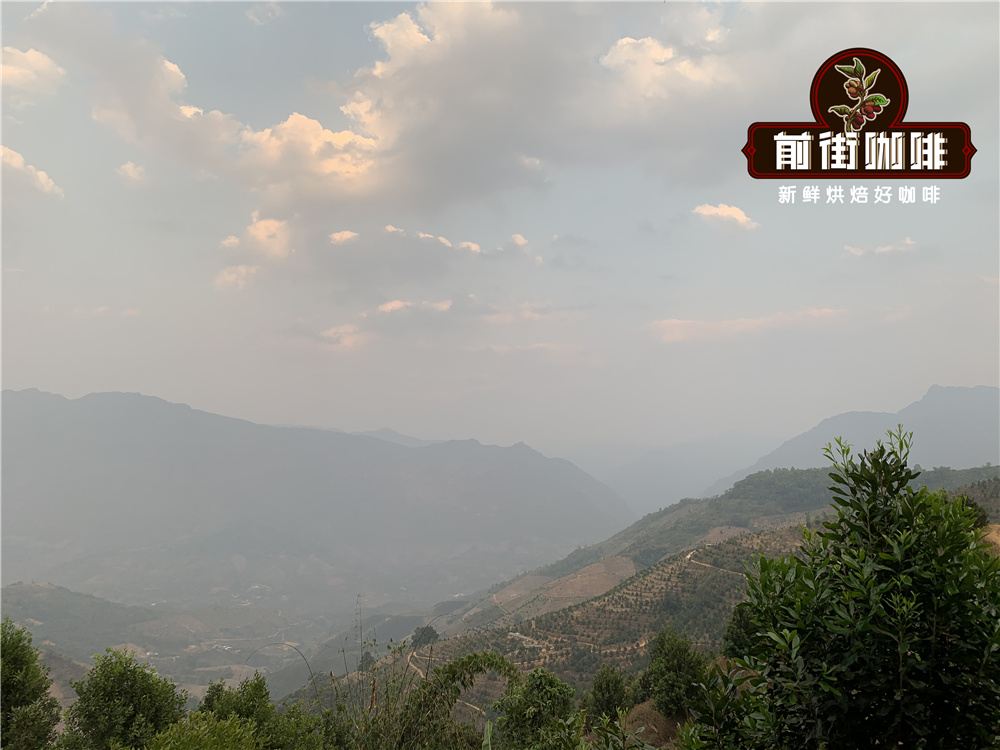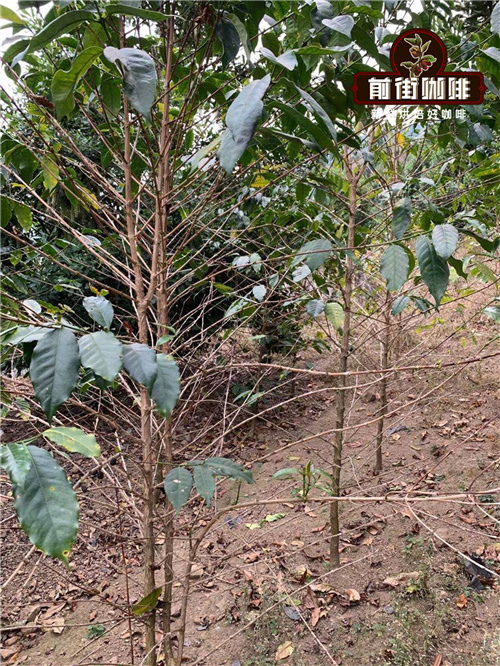The Development History of Coffee in China: the Development History of Yunnan Fine Coffee and the taste of small Coffee

Professional coffee knowledge exchange more coffee bean information please follow the coffee workshop (Wechat official account cafe_style)
Many people know that coffee is grown in Yunnan, but they don't know when Yunnan began to grow coffee. Qianjie Coffee has also formed an inextricable bond with Yunnan through chance and coincidence. In this article, Qianjie Coffee will tell the historical story of Yunnan Coffee and the things about Qianjie growing coffee in Yunnan.
The Development History of Coffee in Yunnan
Yunnan coffee can be traced back to 1904, when Tian Deneng, a French Catholic missionary, preached in Dali, Yunnan via Vietnam, came to Zhukula village to set up a church, and planted a batch of iron pickup coffee trees next to it. This is the beginning of the history of coffee cultivation in Yunnan, and then coffee cultivation in Yunnan will usher in three waves of development.

The first wave of development was in the 1960s, when Yunnan cultivated coffee in order to repay Soviet loans, and the products were acquired by the state foreign trade department. At that time, coffee cultivation was distributed in several agricultural reclamation farms: Baoshan Lujiang Farm, Xincheng Youth Farm, Dehong Shaofang Farm, Ruili Farm, Kucho Farm, Wenshan Babu Farm, and Tianbao Farm. Variety is the local breeding of tin card, bourbon variety, agricultural reclamation of the entire coffee planting area has reached 50,000 mu. After that, due to the end of the repayment work, the foreign trade department no longer actively acquired, and at the same time, due to the spread of induced disease infection, resulting in large-scale death and avoiding the crazy spread of induced disease, once the planting area shrank, leaving less than 3,000 mu.

The second wave of development was in the 1980s of reform and opening up. In 1988, Nestl é decided to support the development of Yunnan coffee industry and introduced Katim to be widely planted in Yunnan. Because of this development, Katim coffee has replaced the status of the ancient tree species Ironka. It has become the main tree species of Yunnan coffee, accounting for 90% of Yunnan coffee production.
The third wave of development is after 2000, when China's economy took off, China introduced the concept of boutique coffee. At the same time, the selection and cultivation of coffee in Yunnan were scientifically developed. At present, the process of high-quality coffee in Yunnan is still in progress.
The things about Qianjie coffee in Yunnan.
Many people's impression of Qianjie coffee is "a warm, self-baked shop". This year is the eighth year of Qianjie coffee, but what many people don't know is that Qianjie coffee is actually grown half a year earlier than roasted. Qianjie Coffee was formerly known as "Dazhen Coffee". It was named because we wanted to grow coffee in a place called Dazhen in Guangdong. When we used Katim to grow seedlings to 20CM, it took us more than half a year to understand the relationship and order of breed, altitude, and treatment.

Choose the right variety, plant it at an appropriate altitude, and test a treatment that can express its unique flavor when it is mature, which is the only logical relationship that Qianjie believes that boutique coffee can have obvious regional flavor.
So we gave up our plan to grow coffee in Guangdong, because the place where the coffee was originally baked was in Baoqian Street, so we renamed "Big Town Coffee" to "Qianjie Coffee". In Qianjie, while baking coffee, we continued to move forward with the idea of growing fine coffee, and successively visited the Institute of Hot Science (Tropical Agricultural Science Research Institute), which had in-depth research on coffee cultivation and the coffee provenance bank of the Ministry of Agriculture, and a small number of farmers who planted fine coffee. We found out the reasons why Yunnan did not grow the mainstream varieties of fine coffee, such as Tielka and bourbon, and found suitable land for planting under the circumstances of coincidence.

Arabica coffee beans are required to grow at an altitude of more than 1000 meters. If you want a better flavor, the higher the altitude you plant. But the elevation of Yunnan universal mountains is only on the qualified line, which is also the disadvantage of Yunnan coffee. In order to make up for the deficiency in altitude, it is necessary to pay better agronomic management under the premise of good coffee varieties.
Qianjie did not buy a ready-made coffee farm, but bought a piece of hills suitable for growing coffee, because Qianjie knew that no matter how good the land was, the coffee grown by unsuitable coffee varieties would not have a good flavor (Katim was common in Yunnan at that time). So I chose a way to grow coffee from scratch.

The coffee variety grown in Qianjie is iron pickup, which is the Arabica species with excellent flavor in coffee. At the same time, the output of iron pickup is very low, which is 1/3 of that of Katim, so why is the price more expensive? At the same time, tin card and bourbon are also very easy to get rust, which is one of the reasons why farmers are reluctant to grow Arabica.

There are no four seasons in Yunnan, only dry season and rainy season, and the same is true in most coffee producing areas, which is the root cause of the use of tanning in some producing areas. June is the beginning of the rainy season in the producing areas, and it will rain for the next three or four months, which is the most favorable time for growing coffee. Only when seedlings are planted at this time and moistened by Rain Water for a few months will they be able to grow well-developed roots to survive the first half-year dry season.

Growing coffee from scratch is also a matter of high time cost. It takes three to four years from the seedling to the first fruit, and then try the right treatment and eventually reproduce it, and it will take as little as five years to get the first batch of coffee. No one can guarantee the production of high-quality high-quality coffee. Qianjie is convinced that there is nothing so easy in the world. After many breeds are selected and refined after fruit production, several years will pass.
Due to the epidemic last year, last year's trip to Yunnan was delayed until this year.

This is the coffee tree planted in Qianjie in May 2016, and now it is more than 3 meters tall.

The tin card seedlings planted in May 2019 now have luxuriant leaves.

The output of coffee in Qianjie in Yunnan this year is about 100 kilograms.

This year Qianjie brought the first batch of coffee fruits back to Guangdong for sun treatment.


Please look forward to the Yunnan coffee you grow, bake and brew in Qianjie this year!
For more boutique coffee beans, please add private Qianjie coffee on Wechat. WeChat account: kaixinguoguo0925
Important Notice :
前街咖啡 FrontStreet Coffee has moved to new addredd:
FrontStreet Coffee Address: 315,Donghua East Road,GuangZhou
Tel:020 38364473
- Prev

Coffee Cupping | A few things you must know before taking the coffee cup test
Professional coffee knowledge exchange more coffee bean information Please pay attention to the coffee workshop (Wechat official account cafe_style) Coffee certificate there is a difficult CQI "coffee quality identification", an in addition to very difficult questions, the registration price is not cheap test, however, still attract a lot of coffee industry to make the challenge. Drink coffee, swallow coffee, drink coffee, sip
- Next

Boutique hand-brewing experiment on the taste characteristics of Colombian coffee
Professional coffee knowledge exchange more coffee bean information please pay attention to the coffee workshop (Wechat official account cafe_style) Colombia is the second largest producer of Arabica beans, high-quality water-washed beans have always been the representative of high-quality coffee exported from Colombia, processors buy from coffee farmers, after specific gravity inspection and manual methods to pick out defective beans, after layers of strict
Related
- Detailed explanation of Jadeite planting Land in Panamanian Jadeite Manor introduction to the grading system of Jadeite competitive bidding, Red bid, Green bid and Rose Summer
- Story of Coffee planting in Brenka region of Costa Rica Stonehenge Manor anaerobic heavy honey treatment of flavor mouth
- What's on the barrel of Blue Mountain Coffee beans?
- Can American coffee also pull flowers? How to use hot American style to pull out a good-looking pattern?
- Can you make a cold extract with coffee beans? What is the right proportion for cold-extracted coffee formula?
- Indonesian PWN Gold Mandrine Coffee Origin Features Flavor How to Chong? Mandolin coffee is American.
- A brief introduction to the flavor characteristics of Brazilian yellow bourbon coffee beans
- What is the effect of different water quality on the flavor of cold-extracted coffee? What kind of water is best for brewing coffee?
- Why do you think of Rose Summer whenever you mention Panamanian coffee?
- Introduction to the characteristics of authentic blue mountain coffee bean producing areas? What is the CIB Coffee Authority in Jamaica?

